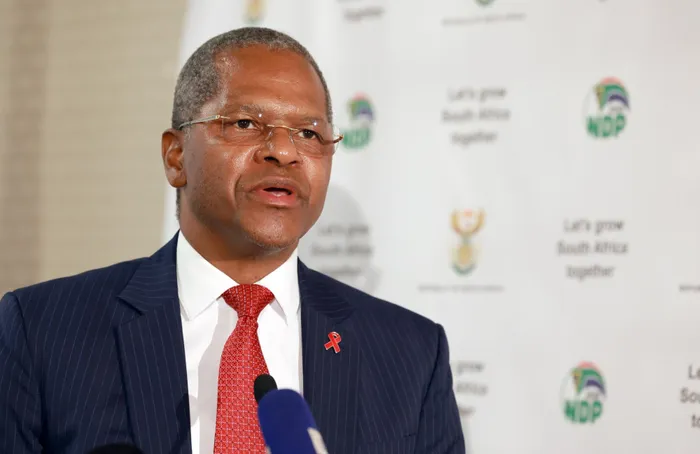Fixing South Africa's ailing municipalities: White paper on local government under review

Cogta Minister Velenkosini Hlabisa said there was a need to reassess the funding model for municipalities.
Image: File Picture
Unethical practices, poor accountability, a broken social contract with communities and the weak integration of traditional governance systems are among the challenges facing South African municipalities.
This is according to a discussion document released as part of the review of the White Paper on Local Government.
The Department of Cooperative Governance has commenced the process of reviewing the White Paper on Local Government, which is expected to be completed next year.
The review process will examine the funding model of municipalities and could lead to the closure of municipalities that are failing to provide services.
The discussion document notes that there is reasonable concern and widespread doubt about the ability of most municipalities to perform their roles effectively.
“Manipulation and methods aimed at maintaining power and/or rapid enrichment have spread, resulting in corrupt, nepotistic, and unethical activities within municipalities. Many political leaders have continued to turn a blind eye to these practices, especially when municipal resources have been used and abused to fund party political operations and campaigns," it said.
The poor relationships with citizens are also a significant issue. “There is a large divide between many municipalities and their communities, including residential, business, university, and institutional communities. The fact that, as of 2024, households owe municipalities a staggering R230.5 billion (74% of total municipal debt) is an indicator of the broken social contract,” said the discussion document.
It further noted that there was weak integration of traditional governance systems which presents both challenges and opportunities for improving citizen service delivery and community development.
“Traditional leaders, who wield significant cultural legitimacy and grassroots influence, command respect from their communities and operate alongside constitutionally mandated municipal structures tasked with democratic governance and service provision. Traditional leaders potentially have an important role to play in nation-building, promoting social cohesion, contributing to municipal integrated development plans,” it said.
Municipal budgets have also borne the brunt of climate-induced disasters, with extreme weather events between 1998 and 2025 increasing emergency expenditures by 320% across South African cities. “Flooding in Durban during the 2022 rainy season required R780 million in unplanned drain clearance and road repairs, diverting funds from scheduled housing projects. The frequency of such events has necessitated permanent budget line items for disaster response,” it concluded.
Cooperative Governance and Traditional Affairs (Cogta) Minister Velenkosini Hlabisa said there was a need to reassess the funding model for municipalities, pointing out that the current model—where municipalities collect 90% of revenue and other spheres of government contribute 10%—is not working.
He added that the number of municipalities will also be revisited, and municipalities that are not delivering services may be dissolved. He stated, “If a municipality is not fit to deliver services, why should we keep that municipality?”
ActionSA member of Parliament Alan Beesley expressed deep concern over the worsening state of municipalities.
He said poor service delivery by the municipalities not only negatively impacts the lived reality of many South Africans but also causes significant damage to the economy. “As such, ActionSA welcomes the Review. It is important that in addressing the challenges faced by municipalities, the review does not become a waste of time and money but rather that the outcomes are pragmatic and implementable. Key challenges are the lack of governance, accountability, and consequence management. This will only change if the corrupt are put in jail and the incompetent are fired.”
DA spokesperson on Cogta Marina Van Zyl stated that they welcomed the review but expressed concern that this process is yet another attempt to repackage systemic failures without a clear path to reform.
“Municipalities across the country are collapsing under the weight of poor governance, unfunded mandates, cadre deployment, and political interference. With only 13% of municipalities receiving clean audits and billions lost to fruitless and unauthorised expenditure, the rot is deep and structural. The DA believes that reform must begin with professionalised local government, strong consequence management, and electoral reform to stabilise fragile coalitions. The DA will engage with the review process constructively but firmly—advocating for reforms that give power back to communities, not to national bureaucrats,” she said.
Local government expert Michael Sutcliffe said after 25 years, it was good that the white paper was being reviewed.
“We should be careful not to disrupt systems that are functioning well and should fix the things that need to be fixed.”
He said while the local government sector has challenges, it has pioneered certain measures especially to help the poor.
“You could travel to other developed countries; concepts like low property rates for poorer households and free basic water are things that are unheard of in those areas."
He emphasised that it was important that the review led to making local government “stronger, agile, and responsive to the needs of the communities.”
Related Topics:
